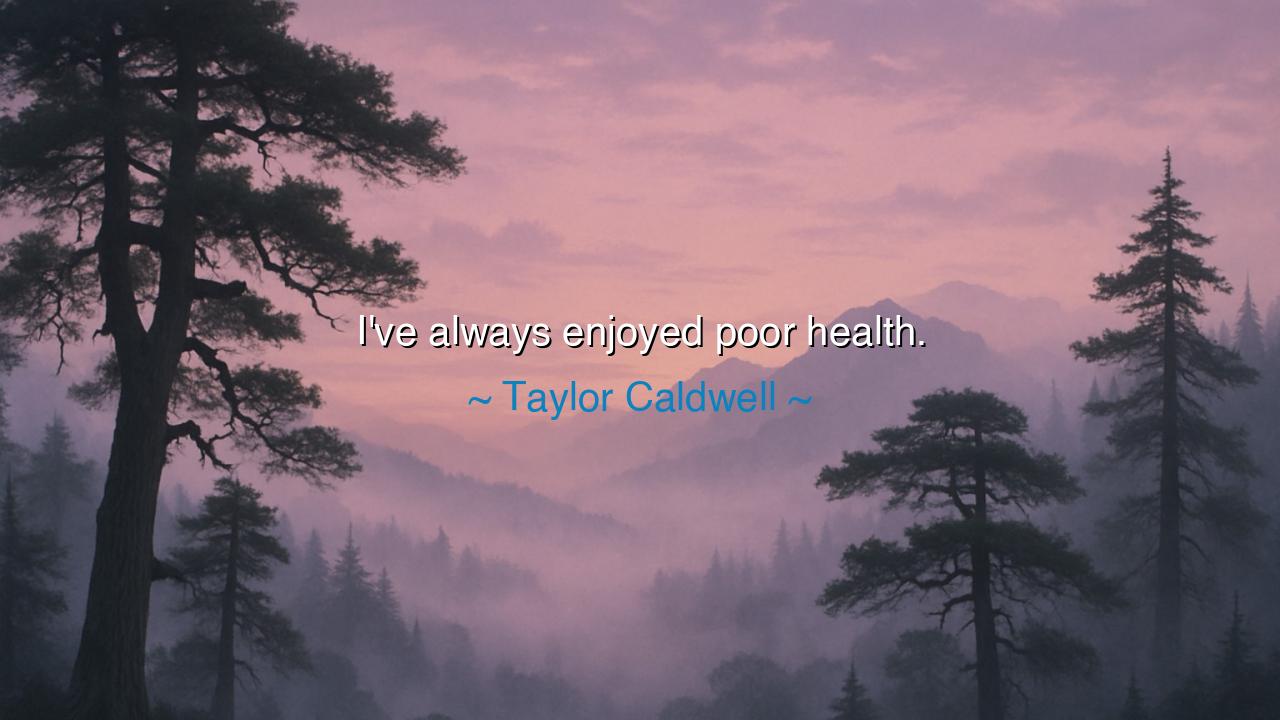
I've always enjoyed poor health.






On Strength Hidden in Suffering: The Paradox of Taylor Caldwell’s Words
Hear now the strange and wondrous saying of Taylor Caldwell: “I’ve always enjoyed poor health.” At first, these words seem a jest, a contradiction, a defiance of reason. How could one enjoy what burdens the body, what weakens the flesh, what chains the spirit in pain? Yet those who live long and think deeply know that within these words lies a sacred paradox, a wisdom older than temples—the understanding that suffering, rightly met, becomes a teacher, and that the weakness of the body may be the strength of the soul.
Caldwell, who wrote of human struggle with the pen of both fury and faith, did not mean she took delight in illness as one delights in comfort. No—she meant that she found in her poor health a strange companionship, a furnace in which her will was refined. For in the fires of frailty, the mind is tempered, and the spirit learns to see what health blinds us to: the fleeting nature of life, the preciousness of time, the small mercies that sustain us. The strong often take the world for granted; the frail are forced to cherish each heartbeat as a gift. Thus, Caldwell’s “enjoyment” was not pleasure—it was gratitude, defiant and luminous.
The ancients, too, knew this truth. Epictetus, the slave turned philosopher, whose body was broken but whose spirit was free, once taught that suffering is not evil, but the material from which virtue is forged. He said that life is like a wrestling school—if you wish to be strong, you must face the trials that test you. So it was with Caldwell. She saw in her ailments not the curse of fate, but the proving ground of endurance. Every fever, every pain, every sleepless night was a lesson in humility, in courage, in patience. To enjoy poor health is to find in struggle the opportunity to transcend it.
Consider also the story of Frida Kahlo, the painter of pain, who endured the breaking of her body and yet turned her wounds into color and creation. Trapped in a body that betrayed her, she painted the landscapes of agony and beauty intertwined. Her art was her rebellion, her healing, her song of survival. She too “enjoyed poor health,” for she transformed suffering into something fierce and eternal. Like Caldwell, she refused to be defeated; instead, she drew from her affliction the energy to illuminate the human condition. Through her suffering, she discovered the boundless strength of the soul.
Caldwell’s phrase carries within it a quiet heroism—the kind that does not shout, but endures. It is the heroism of those who rise each day despite the weight of pain, who work though weary, who love though broken. Such people are the hidden pillars of the world. They remind us that health is not merely the absence of sickness, but the presence of spirit. The body may falter, but the will, if nurtured, can shine brighter than ever before. In this way, poor health becomes a companion, a stern teacher that humbles and deepens those who dare to learn from it.
The lesson, then, is not to seek suffering, but to sanctify it—to find within hardship the seeds of meaning. When pain comes, as it surely will to all, do not curse it at once. Sit with it, learn its language. Ask what it would teach you. For within every affliction lies an unseen gift: empathy, patience, resilience, wisdom. Those who “enjoy” their hardships do not deny their pain—they transform it. They turn bitterness into understanding, despair into art, frailty into faith.
So remember, children of tomorrow: when your strength fails, when your body rebels, when the world grows dim, take heart. You are walking the same path as the wise and the strong who came before you. As Taylor Caldwell herself did, embrace your trials not as punishments but as awakenings. Let your weakness remind you of what truly matters—kindness, humility, the quiet joy of still being alive. And above all, enjoy poor health, not in mockery, but in mastery—by finding in every hardship a chance to rise beyond it. For those who learn to smile through suffering are no longer merely mortal; they are touched by the eternal.






AAdministratorAdministrator
Welcome, honored guests. Please leave a comment, we will respond soon